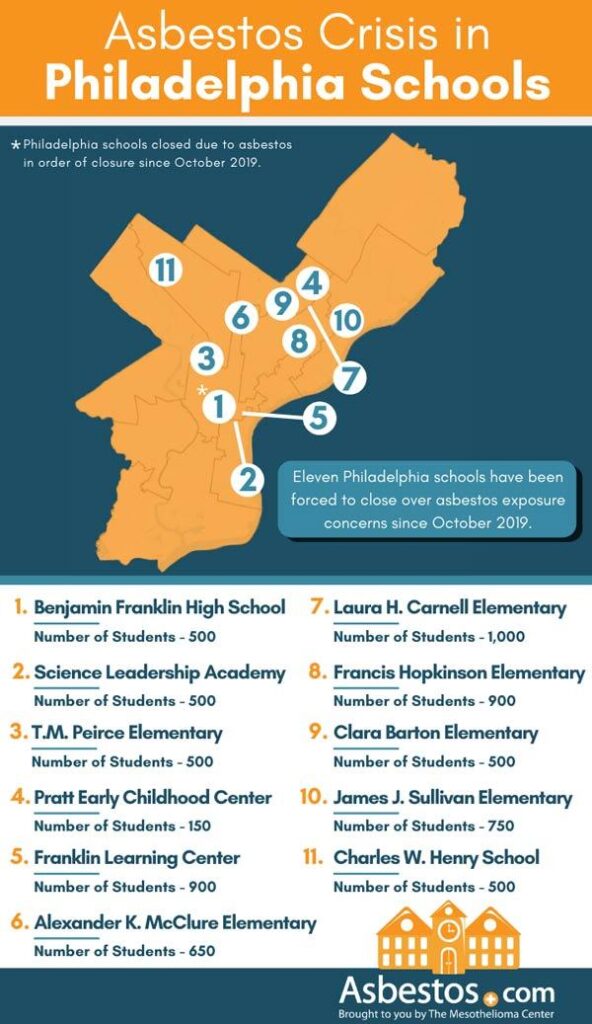Federal Charges Highlight Asbestos Hazards in Philadelphia Schools
Philadelphia School District Under Federal Scrutiny for Asbestos Violations
The Philadelphia School District is currently facing federal allegations concerning improper handling of asbestos in multiple public school buildings. Investigations have uncovered that asbestos-containing materials, some dating back several decades, were neither adequately monitored nor removed despite numerous warnings. This negligence has raised serious health alarms for students, educators, and staff who may have been exposed to airborne asbestos fibers, known to cause life-threatening diseases such as mesothelioma and asbestosis. Federal authorities have pointed to violations of the Asbestos Hazard Emergency Response Act (AHERA) as a key factor in the prolonged exposure risks.
In light of these charges, the district is now compelled to undertake immediate corrective measures and faces potential fines. The federal complaint highlights several critical shortcomings:
- Insufficient asbestos inspection and management protocols
- Lack of timely communication to parents and school personnel regarding asbestos dangers
- Delays in initiating asbestos removal and abatement procedures
This case reflects broader national concerns about asbestos safety in aging educational infrastructures. The district has pledged to prioritize remediation efforts, including thorough inspections and open communication with the community. Below is an outline of the district’s planned response in partnership with federal agencies:
| Task | Deadline | Responsible Entity |
|---|---|---|
| Conduct comprehensive asbestos survey | Within 30 days | Certified Environmental Consultants |
| Inform affected families and staff | Within 15 days | District Communications Team |
| Commence asbestos abatement work | Within 60 days | Licensed Abatement Contractors |
| Implement ongoing air quality monitoring | Continuous | Health and Safety Inspectors |
Understanding the Health Dangers and Legal Responsibilities of Asbestos in Schools
Asbestos exposure presents grave health risks, especially in school environments where children and staff spend extended periods. Inhalation of asbestos fibers can result in severe diseases such as mesothelioma, lung cancer, and asbestosis, often with symptoms emerging decades after exposure. Older school buildings frequently contain asbestos in materials like insulation, floor tiles, and ceiling panels, which can degrade or be disturbed during renovations, releasing hazardous fibers into the air.
From a legal standpoint, schools must adhere to stringent federal mandates, including the Asbestos Hazard Emergency Response Act (AHERA), which requires proper identification, management, and abatement of asbestos-containing materials. Noncompliance not only jeopardizes health but also exposes districts to substantial penalties and lawsuits. The Philadelphia School District’s current federal charges exemplify the serious legal consequences of neglecting asbestos safety. Key legal obligations and their associated penalties include:
| Obligation | Possible Penalty |
|---|---|
| Implementing thorough asbestos inspection and management plans | Fines up to $37,500 per violation |
| Prompt removal or containment of damaged asbestos materials | Mandatory remediation and legal action |
| Timely notification to parents, staff, and regulatory bodies | Enforcement orders and increased public scrutiny |
How Mesothelioma Guide Supports Awareness and Assistance for Affected Families
Mesothelioma Guide plays a crucial role in educating the public about the dangers of asbestos exposure, particularly in communal spaces like schools. By analyzing legal developments such as the federal charges against the Philadelphia School District, the guide helps clarify the gravity of asbestos-related health risks. It also provides vital information on symptoms, diagnosis, treatment options, and legal rights for those impacted by mesothelioma and other asbestos-induced conditions.
Beyond raising awareness, the guide offers comprehensive support to families affected by asbestos-related illnesses through:
- Access to specialized medical professionals and treatment centers focused on mesothelioma
- Legal advice regarding compensation claims and litigation processes
- Community forums for sharing experiences and emotional support
- Updates on evolving litigation trends and regulatory changes impacting affected populations
| Resource Category | Details | Benefits |
|---|---|---|
| Medical Information | Symptoms, diagnosis, treatment options | Facilitates early detection and improved patient care |
| Legal Support | Claims, lawsuits, compensation guidance | Provides financial assistance and legal justice |
| Support Networks | Community engagement and counseling services | Enhances emotional well-being and shared understanding |
Essential Measures for Philadelphia Schools to Guarantee Safe Educational Spaces
To safeguard the health of students, faculty, and staff, Philadelphia schools must adopt stringent asbestos management practices. This involves conducting regular, detailed asbestos inspections by accredited professionals, making findings accessible to the public, and promptly informing stakeholders about any identified hazards. Prioritizing the removal of damaged asbestos materials and adhering to safe abatement protocols are critical to reducing exposure risks within school environments.
Additionally, schools should develop and enforce policies for continuous monitoring and upkeep of asbestos-containing materials (ACMs). These policies should include:
- Comprehensive asbestos awareness training for staff
- Routine air quality assessments
- Establishment of a clear reporting system for asbestos concerns
Collaborating with local health departments and parent organizations can further enhance transparency and ensure compliance with federal safety standards.
Final Thoughts
The federal indictment of the Philadelphia School District marks a pivotal moment in the ongoing effort to secure safe learning environments free from asbestos hazards. Asbestos exposure remains a pressing public health challenge, especially in older school infrastructures where abatement may have been insufficient. This case highlights the necessity for rigorous inspections, transparent communication, and swift remediation actions in schools nationwide. For families, educators, and communities, staying informed about asbestos risks and related legal developments is vital to advocating for safer educational settings. The resolution of this case will not only influence Philadelphia but could also establish important benchmarks for asbestos management in schools across the United States.








